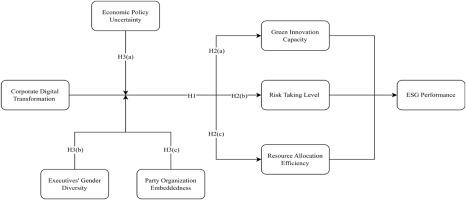通过数字化转型提高环境、社会和公司治理绩效:中国制造业的启示
IF 10.1
1区 社会学
Q1 SOCIAL ISSUES
引用次数: 0
摘要
本研究运用可持续发展理论和利益相关者理论,以2015-2020年中国制造业上市公司为研究对象,探讨企业数字化转型(DIT)如何影响ESG(环境、社会和治理)绩效。分析采用了两阶段最小二乘法模型(2SLS)和倾向得分匹配-差异(PSM-DID)技术来解决内生性问题,并进行了一系列稳健性检验来验证结果。研究结果表明,DIT 通过促进绿色创新、鼓励风险承担和优化资源配置,提高了企业的环境、社会和治理绩效。经济政策的不确定性和高管的性别多样性阻碍了这些益处的实现,而党组织的嵌入性则没有显示出调节作用。此外,研究还发现了 DIT 对环境、社会和公司治理绩效的空间溢出效应,在同一地区和行业的公司之间观察到了协同效应。这些见解为政府改善商业环境、促进绿色发展、确保在利益相关者之间公平分配 "数字红利 "提供了深远影响。本文章由计算机程序翻译,如有差异,请以英文原文为准。

Enhancing ESG performance through digital transformation: Insights from China's manufacturing sector
This study uses sustainability and stakeholder theories to examine how corporate digital transformation (DIT) impacts ESG (Environmental, Social, Governance) performance, focusing on listed Chinese manufacturing firms from 2015 to 2020. The analysis employs two-stage least squares model (2SLS) and propensity score matching-differences in differences (PSM-DID) technique to address endogeneity, and a series of robustness checks to validate the results. Findings reveal that DIT enhances ESG performance by fostering green innovation, encouraging risk-taking, and optimizing resource allocation. Economic policy uncertainty and executives' gender diversity impede these benefits, while party organization embeddedness shows no moderating effect. Additionally, the study identifies spatial spillover effects of DIT on ESG performance, with synergistic effects observed among companies within the same locality and industry. These insights offer profound implications for governmental efforts to improve the business environment and promote green development, ensuring the equitable distribution of "digital dividends” among stakeholders.
求助全文
通过发布文献求助,成功后即可免费获取论文全文。
去求助
来源期刊

Technology in Society
Multiple-
CiteScore
17.90
自引率
14.10%
发文量
316
审稿时长
60 days
期刊介绍:
Technology in Society is a global journal dedicated to fostering discourse at the crossroads of technological change and the social, economic, business, and philosophical transformation of our world. The journal aims to provide scholarly contributions that empower decision-makers to thoughtfully and intentionally navigate the decisions shaping this dynamic landscape. A common thread across these fields is the role of technology in society, influencing economic, political, and cultural dynamics. Scholarly work in Technology in Society delves into the social forces shaping technological decisions and the societal choices regarding technology use. This encompasses scholarly and theoretical approaches (history and philosophy of science and technology, technology forecasting, economic growth, and policy, ethics), applied approaches (business innovation, technology management, legal and engineering), and developmental perspectives (technology transfer, technology assessment, and economic development). Detailed information about the journal's aims and scope on specific topics can be found in Technology in Society Briefings, accessible via our Special Issues and Article Collections.
 求助内容:
求助内容: 应助结果提醒方式:
应助结果提醒方式:


